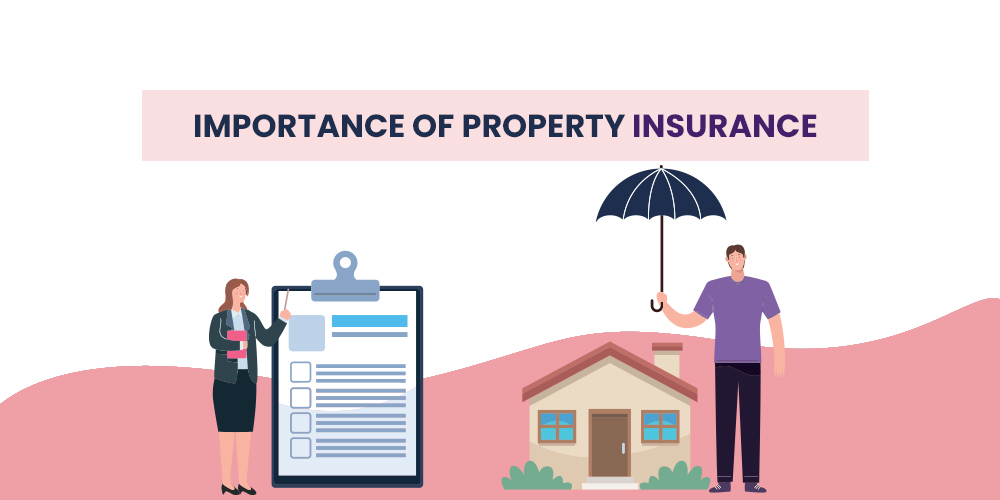The Importance of Insurance for Investment Properties
Discover why insurance is crucial for protecting your investment properties. Learn how proper coverage safeguards your assets from unexpected risks and ensures financial security."

Investing in property is a robust strategy for building wealth, but it also comes with its own set of risks. Ensuring that your investment properties are adequately covered by insurance is crucial to protect yourself from significant financial losses. Here’s an in-depth look at why insurance is essential for investment properties, the factors that influence insurance premiums, and examples of high-CPC keywords related to this niche.
Why Insurance Matters for Investment Properties
Investment properties, whether residential or commercial, face a range of potential risks that could lead to substantial financial losses. These risks include:
Property Damage: Natural disasters such as floods or earthquakes, as well as vandalism or fire, can cause significant damage to a property. Without proper insurance coverage, the costs for repairs or rebuilding can be overwhelming.
Liability Risks: As a landlord or property owner, you may be held liable for injuries that occur on your property. This could include slip-and-fall accidents or other mishaps. Liability insurance helps protect you from the financial fallout of such incidents.
Loss of Rental Income: If your property becomes uninhabitable due to a covered peril, insurance can provide compensation for lost rental income, which is crucial for maintaining your cash flow.
Legal and Management Costs: Insurance can also help cover the costs associated with legal disputes or property management issues, which can otherwise be financially draining.
Key Factors Influencing Insurance Premiums
The cost of insurance for investment properties can vary significantly based on several factors:
Location: The geographic location of your property plays a major role in determining premiums. Properties in high-risk areas, such as those prone to flooding or earthquakes, will typically have higher insurance rates. For instance, properties in Sacramento might face different risks compared to those in Richmond.
Property Type: The type of property you are insuring—whether it is a single-family home, multi-family dwelling, or commercial building—affects the insurance premium. For example, property insurance for landlords who own multiple units may have different rates compared to those with single rental homes.
Property Value: The higher the value of the property, the higher the premium. This is because more expensive properties will cost more to repair or replace. High-value home insurance would be a consideration for luxury or high-end properties.
Coverage Amount: The extent of coverage you choose will impact the premium. Policies with broader coverage, such as those including flood insurance coverage or natural disaster insurance, generally come with higher premiums.
Deductibles: Higher deductibles often result in lower premiums, but this means you will need to pay more out-of-pocket if a claim is made. Balancing your deductible with your premium is essential.
Claims History: A history of frequent claims can increase your premiums. Insurance companies view a history of claims as indicative of higher risk.
Examples of High-CPC Keywords Related to This Niche
When searching for insurance options, especially for investment properties, using the right keywords can help in finding the best deals. Here are some high-CPC (Cost Per Click) keywords relevant to this niche:
- Property insurance for landlords: This keyword targets landlords looking for insurance specific to their rental properties.
- Insurance for investment properties: A broad term that covers insurance solutions for various types of investment properties.
- Liability insurance for property owners: Focuses on the liability coverage needed to protect against claims from tenants or visitors.
- Home insurance for high-risk areas: Targets insurance solutions for properties located in areas prone to natural disasters.
- Insurance for commercial buildings: For investors who own commercial properties, this keyword helps find appropriate coverage.
Examples of Insurance Types for Investment Properties
Homeowners Insurance Quotes: Essential for covering property damage, liability, and loss of rental income. Quotes can help compare different insurance providers and find the best rates.
Renters Insurance Policies: While primarily for tenants, understanding these can help landlords recommend adequate coverage for their renters.
Condo Insurance Quotes: For those who invest in condominium units, this type of insurance offers coverage specific to condo properties.
Umbrella Insurance for Homeowners: Provides additional liability coverage above and beyond the limits of a standard policy, which can be crucial for high-net-worth individuals.
Insurance for Historic Homes: Special coverage for properties with historical significance, which may face different risks compared to standard homes.
Insurance for Various Scenarios
Insurance for Vacation Homes: Protects rental properties that are used seasonally or as vacation rentals.
Home Insurance for First-Time Buyers: While not specifically for investment properties, first-time buyers may need to understand insurance basics as they begin investing.
Insurance for Mobile Homes: For investors who own mobile or manufactured homes, specific coverage is necessary.
Insurance for Vacant Properties: Properties that are not currently rented out require special insurance to cover the increased risk of vandalism or maintenance issues.
Home Warranty vs. Homeowners Insurance: While homeowners insurance covers property damage and liability, a home warranty provides protection for home systems and appliances.
Comprehensive Guide for Real Estate Investors: Choosing the Best Insurance for Your Investment Properties
Investing in real estate can be a lucrative venture, but it also comes with its fair share of risks. To protect your investment, having the right insurance coverage is crucial. This guide will help real estate investors navigate the complexities of property insurance, highlighting the benefits of different types of coverage and how to leverage high-CPC keywords like 'property insurance' and 'investment property protection' for effective SEO.
Understanding Different Types of Insurance Coverage
1. Property Insurance for Landlords
For real estate investors, property insurance for landlords is a cornerstone of risk management. This type of coverage protects rental properties from damage caused by events like fire, theft, or vandalism. It typically includes:
- Dwelling Coverage: Pays for repairs or rebuilding of the property structure.
- Liability Insurance: Covers legal costs if a tenant or visitor is injured on the property.
- Loss of Rental Income: Compensates for lost income if the property becomes uninhabitable due to a covered event.
Property insurance quotes can vary based on location, property type, and coverage limits. For instance, in Omaha and Sacramento, the cost may differ due to local risk factors and market conditions.
2. Flood Insurance Coverage
Flooding can cause significant damage, and standard property insurance policies often exclude this risk. Flood insurance coverage is crucial, especially if your investment property is located in a flood-prone area. It typically covers:
- Structural Damage: Repairs to the building itself.
- Personal Property: Replacement of damaged personal items and equipment.
Investors in Richmond and Albuquerque should be particularly aware of flood risks specific to their regions.
3. High-Value Home Insurance
For properties with a higher market value, high-value home insurance offers additional protection. This coverage is designed for homes that exceed standard coverage limits, providing:
- Extended Coverage Limits: To cover the full value of high-end properties.
- Specialized Coverage: For valuable personal items and unique features.
In cities like Rochester and Sacramento, where luxury homes might be prevalent, this type of insurance ensures adequate protection.
4. Umbrella Insurance for Homeowners
Umbrella insurance for homeowners provides an extra layer of liability protection beyond standard policy limits. This type of insurance is beneficial for real estate investors with multiple properties or high-value assets, covering:
- Excess Liability: Over and above what is provided by underlying policies.
- Legal Fees: Associated with lawsuits and claims.
5. Home Warranty vs. Homeowners Insurance
Understanding the difference between home warranty and homeowners insurance is crucial. A home warranty typically covers repairs and replacements of home systems and appliances due to normal wear and tear, whereas homeowners insurance covers damage to the property from unforeseen events.
6. Insurance for Vacation Homes
If your investment property is a vacation home, specialized insurance policies are available. These policies may cover:
- Short-Term Rental Risks: Different from standard rental properties.
- Seasonal Damage: Potential issues from periods of vacancy.
7. Insurance for Rental Properties
Investors should also consider insurance for rental properties that covers specific risks associated with tenants. This may include:
- Tenant Damage: Protection against damage caused by tenants.
- Loss of Rent: If the property becomes uninhabitable.
8. Insurance for Historic Homes
Insurance for historic homes addresses the unique risks associated with older properties. Coverage often includes:
- Restoration Costs: Higher costs for materials and labor to restore historical features.
- Specialized Coverage: For the unique construction and historical value.
9. Natural Disaster Insurance
Natural disaster insurance is essential if your investment property is in an area prone to events like earthquakes, hurricanes, or wildfires. This insurance covers:
- Damage from Disasters: Including structural and personal property damage.
- Additional Living Expenses: If you need to relocate during repairs.
10. Insurance for Vacant Properties
Insurance for vacant properties is necessary if your property is unoccupied for an extended period. Standard property insurance might not cover vacant properties, so specialized policies are:
- Extended Coverage: For risks associated with unoccupied buildings.
- Vandalism and Theft: Increased risk in vacant properties.
Leveraging Keywords for Effective SEO
To maximize your reach and attract potential clients or investors, it’s important to use high-CPC keywords effectively. Here's how to integrate them into your content:
Property Insurance Quotes
Use property insurance quotes in titles, headers, and throughout the content. Offer valuable insights on how to obtain quotes and compare options to attract readers looking for insurance pricing information.
Homeowners Insurance Quotes
Incorporate homeowners insurance quotes to appeal to those searching for general home insurance pricing. Compare different rates and provide tips for obtaining the best deals.
Best Home Insurance Rates
Discuss strategies for finding the best home insurance rates and highlight factors that influence pricing. This will cater to users looking for ways to save on insurance costs.
Home Insurance Comparison
Create content around home insurance comparison to help readers evaluate various insurance providers and plans. Include a comparison table or checklist for easy reference.
Property Insurance for Landlords
Focus on property insurance for landlords to attract real estate investors seeking landlord-specific coverage. Offer detailed information on policy options and benefits.
Flood Insurance Coverage
Discuss flood insurance coverage and its importance for properties in flood-prone areas. Provide examples and statistics to emphasize the need for this coverage.
Insurance for Rental Properties
Highlight the importance of insurance for rental properties and the different types of coverage available. Include tips for finding the right policy for rental investments.
Best Property Insurance Companies
Research and list the best property insurance companies to guide readers in choosing reputable insurers. Include customer reviews and ratings for added credibility.
Home Insurance Policy Reviews
Offer home insurance policy reviews to help readers understand the pros and cons of different insurance plans. Include user feedback and expert opinions to provide a balanced view.
Home Insurance for First-Time Buyers
Provide information on home insurance for first-time buyers to assist new homeowners in understanding their insurance needs and options.
The Impact of Insurance on the Financial Stability of Investment Properties
In the realm of real estate investing, insurance plays a pivotal role in safeguarding financial stability and optimizing returns. Whether you’re managing rental property insurance, landlord insurance policies, or specialized coverage, the right insurance can mitigate risks and enhance profitability. This article delves into the various insurance policies that impact investment properties, highlighting their significance and benefits.
The Importance of Insurance for Investment Properties
Investment properties are assets that can yield substantial returns, but they also come with inherent risks. Effective insurance for rental properties can shield property owners from financial loss caused by unforeseen events, such as natural disasters, tenant disputes, or property damage.
Insurance for investment properties helps to:
Mitigate Financial Loss: In the event of property damage or loss, having the right insurance ensures that you’re not left bearing the full financial burden. This can include damage from fire, vandalism, or natural disasters.
Optimize Returns: By protecting your property from potential risks, insurance allows you to focus on maximizing your investment returns without the constant worry of unforeseen costs.
Enhance Property Value: Properties with comprehensive insurance coverage are often more attractive to potential buyers or renters, contributing to higher property values.
Key Types of Insurance Policies for Investment Properties
1. Rental Property Insurance
Often referred to as landlord insurance, this policy is tailored for those who rent out their properties. It typically covers:
- Property Damage: Protection against damages caused by tenants, accidents, or natural disasters.
- Liability Coverage: Safeguards against legal costs if a tenant or visitor is injured on the property.
- Loss of Rental Income: Compensation for lost rental income if the property becomes uninhabitable due to covered damages.
2. Landlord Insurance Policies
Similar to rental property insurance but often with additional features, landlord insurance policies include:
- Building Insurance: Covers the physical structure of the property against risks such as fire or storm damage.
- Contents Insurance: Protects furnishings and appliances provided by the landlord.
- Legal Expenses: Covers costs associated with tenant disputes or eviction proceedings.
3. Flood Insurance Coverage
For properties in flood-prone areas, flood insurance coverage is essential. This policy protects against damage from flooding, which is typically excluded from standard property insurance.
4. Liability Insurance for Property Owners
Liability insurance for property owners provides protection against claims for injury or property damage that occurs on the rental property. This is particularly important in high-risk areas where accidents might be more common.
5. Umbrella Insurance for Homeowners
Umbrella insurance for homeowners offers an extra layer of liability coverage beyond the limits of standard property insurance. This can be invaluable in the event of large claims or lawsuits.
6. Insurance for Historic Homes
For investment properties that are historic or have significant value, insurance for historic homes provides specialized coverage for their unique risks and higher replacement costs.
Optimizing Returns with the Right Insurance
To optimize returns on investment properties, consider these strategies:
Compare Insurance Quotes: Use tools to get homeowners insurance quotes, property insurance quotes, and home insurance comparison to find the best rates and coverage for your needs. Cities like Omaha, Sacramento, Rochester, Albuquerque, and Richmond have diverse insurance markets, so comparing quotes locally can help you find the best deals.
Evaluate Coverage Needs: Assess whether you need additional coverage such as natural disaster insurance, insurance for vacation homes, or insurance for mobile homes based on the specific risks associated with your property.
Consider Home Warranty vs. Homeowners Insurance: While home warranty vs. homeowners insurance might seem similar, they serve different purposes. A home warranty covers repairs and replacements of appliances and systems, while homeowners insurance covers structural damage and liability.
Review Policy Limits and Exclusions: Ensure your policy limits are adequate and understand any exclusions that may affect your coverage. This is crucial in high-risk areas or for properties with unique features.
Utilize Discounts and Bundles: Look for home insurance discounts or bundling opportunities with other policies to reduce overall costs. Many insurance companies offer savings for combined policies or multiple properties.
What is real estate investment insurance?
Real estate investment insurance, also known as property investment coverage, is a type of policy designed to protect property owners from financial losses related to their investment properties. This coverage is tailored to the specific needs of investors, whether they own single-family rentals, multi-family units, or commercial properties.
2. What types of insurance are available for investment properties?
There are several types of insurance policies available for investment properties:
- Landlord Insurance: Also known as property insurance for landlords, this policy covers property damage, liability, and loss of rental income.
- Vacation Home Insurance: For properties used as short-term rentals, such as vacation homes.
- Commercial Property Insurance: This covers office buildings, retail spaces, and other commercial properties.
- Flood Insurance Coverage: Essential if your property is located in a flood-prone area.
- Umbrella Insurance: Provides additional liability coverage beyond the limits of your standard policy.
3. What does landlord insurance cover?
Landlord insurance typically includes:
- Property Damage: Coverage for damage caused by tenants, natural disasters, or other perils.
- Liability Insurance: Protection against legal claims from tenants or visitors who may be injured on your property.
- Loss of Rental Income: Compensation for lost income if the property becomes uninhabitable due to a covered loss.
4. How can I get the best property insurance quotes?
To get the best property insurance quotes, consider:
- Comparing Policies: Use tools to perform a home insurance comparison to find the most competitive rates.
- Checking Discounts: Look for home insurance discounts that may apply to your property.
- Evaluating Coverage: Ensure the policy meets your specific needs, such as high-value home insurance or insurance for historic homes.
5. What are the coverage limits for investment property insurance?
Coverage limits vary based on the policy and the provider. You can choose limits based on the property’s value, the level of risk, and your investment goals. Make sure to discuss limits with your insurance agent to ensure adequate protection.
6. How do I file a claim on my investment property insurance?
To file a claim:
- Notify Your Insurance Company: Contact your insurer as soon as possible after the incident.
- Document the Damage: Take photos and keep records of all damages.
- Submit a Claim: Provide your insurer with all necessary documentation and details.
- Work with an Adjuster: An insurance adjuster may visit your property to assess the damage and determine the claim amount.
7. Is flood insurance necessary for investment properties?
Flood insurance coverage is essential if your property is in a flood zone or a high-risk area. Standard property insurance policies often do not cover flood damage, so a separate flood insurance policy is necessary for comprehensive protection.
8. How does property insurance differ from homeowners insurance?
Property insurance for investment properties is specifically designed for landlords and investors. Unlike homeowners insurance, which covers owner-occupied residences, investment property insurance addresses the unique risks associated with rental or commercial properties.
9. What is the difference between a home warranty and homeowners insurance?
- Homeowners Insurance: Covers damage to your property and liability for accidents that occur on the premises.
- Home Warranty: Provides coverage for the repair or replacement of home systems and appliances, such as HVAC units and plumbing.
10. Can I get insurance for a vacant property?
Yes, you can get insurance for vacant properties. However, vacant properties often require a specialized policy or endorsement due to the increased risk of vandalism and damage. Be sure to discuss your needs with an insurance provider to find the right coverage.
11. What should I consider for properties in high-risk areas?
For properties in high-risk areas, such as those prone to natural disasters, it’s important to have adequate coverage. Consider policies that include natural disaster insurance and liability insurance for property owners. Insurance for mobile homes and home insurance for new construction may also have specific requirements based on the risk level.
12. How can I find the best property insurance companies?
To find the best property insurance companies:
- Read Reviews: Look for reviews and ratings of insurance providers.
- Get Recommendations: Ask fellow investors or real estate professionals for their recommendations.
- Compare Quotes: Use comparison tools to evaluate policies from different companies.
13. Are there insurance options for home-based businesses?
Yes, if you run a home-based business, you may need additional coverage. Insurance for home-based businesses can protect your business equipment and liability risks associated with operating from your home.
14. What is the insurance claims process like?
The home insurance claims process typically involves reporting the incident, documenting the damage, and working with an adjuster to assess and settle the claim. It’s crucial to keep detailed records and follow up with your insurance company throughout the process.
15. How do I get insurance for my rental properties in specific cities?
If you’re investing in properties in cities like Omaha, Sacramento, Rochester, Albuquerque, or Richmond, you’ll want to find local insurance providers who are familiar with the risks and regulations in those areas. Local agents can provide tailored advice and policies based on regional factors.
16. What are some common insurance discounts for investment properties?
Common home insurance discounts for investment properties may include:
- Multi-Policy Discounts: If you have multiple policies with the same insurer.
- Security System Discounts: For properties equipped with security systems.
- Claims-Free Discounts: For properties with a history of no claims.
17. How can I compare home insurance rates?
To find the best home insurance rates, use online comparison tools and obtain quotes from multiple insurers. Consider factors such as coverage limits, deductibles, and discounts to make an informed decision.
Determining the Right Amount of Insurance Coverage for Vacation Homes
Owning a vacation home is a dream for many, providing a retreat from everyday life and a potential income source if rented out. However, ensuring that this property is properly insured is crucial for protecting your investment. Here's a guide to help property owners in cities like Omaha, Sacramento, Rochester, Albuquerque, and Richmond determine the right amount of insurance coverage for their vacation homes.
1. Assess Property Value
The first step in determining the right amount of insurance coverage is to evaluate the property value. This includes the cost of rebuilding or repairing the home in the event of damage. Vacation homes often have unique features or high-end finishes that can increase their value, so it's essential to consider these aspects when determining coverage.
- Homeowners insurance quotes can help provide an estimate based on the value of your property. For high-value vacation homes, high-value home insurance might be necessary to cover the cost of luxury features and materials.
2. Understand Location Risks
The location of your vacation home plays a significant role in determining your insurance needs. Different areas have different risks, such as flooding, earthquakes, or hurricanes. For instance:
Flood insurance coverage is crucial in flood-prone areas like certain parts of Sacramento or Albuquerque. Standard homeowners insurance policies often do not cover flood damage, so separate flood insurance may be needed.
In places prone to earthquakes like parts of Sacramento, you might need additional coverage or a separate earthquake insurance policy.
Natural disaster insurance can be important in regions prone to specific weather events, such as hurricanes in coastal areas or severe storms in the Midwest.
3. Consider Rental Income Potential
If you plan to rent out your vacation home, your insurance needs may differ. You'll need coverage that protects not just the property but also any rental income you might lose if the home is damaged and uninhabitable.
Property insurance for landlords is essential if you're renting out your vacation home. This type of policy typically covers loss of rental income, liability issues, and property damage.
Insurance for rental properties often includes provisions for damages caused by tenants, which may not be covered under a standard homeowners policy.
4. Review Liability Insurance
Liability insurance is crucial for any property owner, especially if you host guests or rent out your vacation home. This coverage helps protect you from legal claims or lawsuits arising from accidents or injuries that occur on your property.
Liability insurance for property owners is important, particularly if you have guests staying at your vacation home.
For additional protection, consider umbrella insurance for homeowners, which offers extra liability coverage beyond what is included in your standard policy.
5. Evaluate Special Insurance Needs
Certain properties may require additional types of coverage due to their specific characteristics or risks:
Insurance for historic homes might be necessary if your vacation home is a historic property that requires special restoration or maintenance.
Insurance for mobile homes or insurance for new construction may apply if your vacation home falls into these categories.
If you have a home-based business operating from your vacation home, additional coverage might be needed to protect business assets and operations.
6. Compare Insurance Quotes
To find the best coverage for your vacation home, it's important to shop around and compare different insurance quotes. Consider factors such as coverage limits, deductibles, and premium costs when comparing policies.
Use home insurance comparison tools to evaluate various policies and find the best home insurance rates for your needs.
Home insurance policy reviews can provide insights into the coverage and claims experience of different insurance providers.
7. Explore Discounts and Savings
Many insurance companies offer discounts that can help reduce your premiums. These might include:
Home insurance discounts for installing security systems or making home improvements.
Bundling policies, such as combining your vacation home insurance with other types of insurance like auto insurance, can also lead to savings.
8. Understand the Claims Process
It's important to understand how the claims process works in case you need to file a claim. This includes knowing the steps to take, documentation required, and how long it typically takes to receive compensation.
- Research the home insurance claims process with different insurance providers to ensure you’re comfortable with their procedures and customer service.
FAQ: Insurance for Investment Properties
Investing in real estate can be a lucrative venture, but it also comes with its share of risks. One crucial aspect of managing these risks is securing the right insurance for your investment properties. Whether you own rental homes, vacation properties, or commercial buildings, understanding your insurance options is essential. Here’s a comprehensive FAQ to guide you through the nuances of insurance for investment properties.
What's Your Reaction?
















